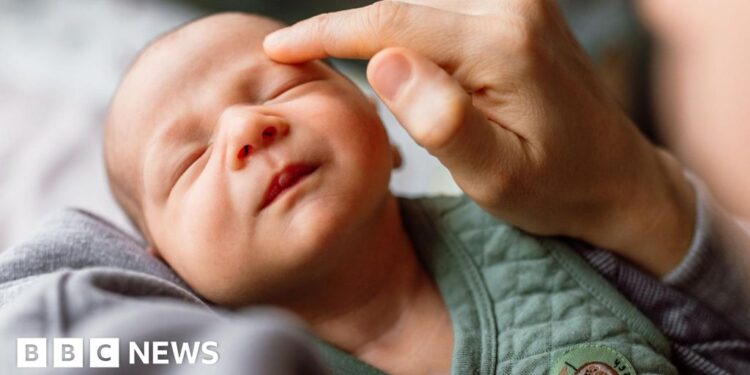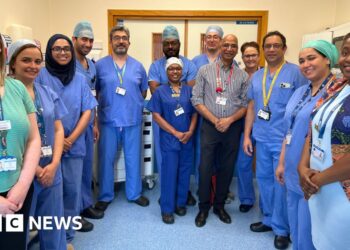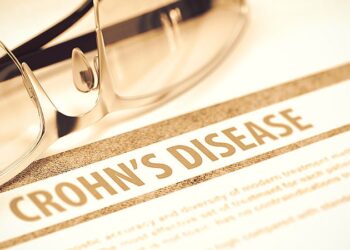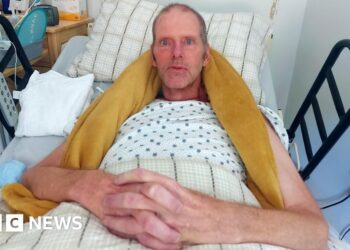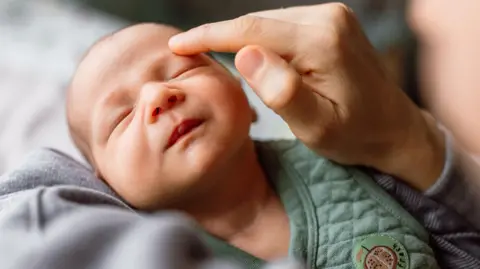 Getty Images
Getty ImagesThe first bacteria our bodies meet – in the hours after we’re born – could protect us from dangerous infections, UK scientists say.
They have shown, for the first time, that good bacteria seem to halve the risk of young children being admitted to hospital with lung infections.
The researchers said it was a “phenomenal” finding and could lead to therapies that boost good bacteria in babies.
Our early encounters with microbes are thought to be crucial in how our immune system develops.
We come out of the womb sterile, but this doesn’t last for long. All the nooks and crannies of the human body become home to a world of microbial life, known as the microbiome.
Researchers at University College London and the Sanger Institute investigated the earliest stages in our body’s colonisation by bacteria, fungi and more.
They collected stool samples from 1,082 newborns in the first week of life. The team then performed a massive genetic analysis on all the DNA in the samples to work out exactly which species were present and how common they were in each child.
They then tracked what happened to those babies, using hospital data, for the next two years.
 Getty Images
Getty ImagesOne particular early inhabitant of the human body, Bifidobacterium longum, seemed to have a protective effect.
Only 4% of babies with this species would spend a night in hospital with a lung infection over the next two years. Babies with different starter-bacteria were two-to-three times more likely to need to stay in hospital.
It is the first data to show the formation of the microbiome affects the risk of infection.
“I think it’s really phenomenal. It’s amazing to be able to show this. I’m excited,” Prof Nigel Field, from UCL, told the BBC.
How are these bacteria doing it?
The most likely culprit for children ending up in hospital is respiratory syncytial virus (RSV), but what joins the dots between this and B. longum?
That is the “million dollar question” for Prof Field.
We know B. longum starts off digesting breast milk which both contains food for the baby and encourages good bacteria.
The exact details have not yet been worked out, but either the bacteria themselves or the compounds they make by digesting food are interacting with the immune system “and are influencing the way in which the immune system matures and is able to recognise friend from foe,” according to Prof Field.
The protective bacteria were found only in babies that came into the world via a vaginal delivery rather than a caesarean. Even then they were not discovered after every vaginal delivery.
The researchers say their findings do not justify the practice of vaginal seeding, where some new parents smear babies with a swab taken from the vagina.
The good bacteria seem to be coming from the end of the mother’s digestive system, an idea known in the field as the “first lick”.
“I feel pretty confident in saying that vaginal seeding is not a good thing,” said Prof Field.
However, the long-term ambition is to come up with microbial therapies – like a probiotic yogurt – that could be given to babies to set their microbiomes on a healthy path.
Prof Louise Kenny, from the University of Liverpool and a consultant obstetrician and gynaecologist, said: “A caesarean section is often a life-saving procedure, and can be the right choice for a woman and her baby.”
She said that while the benefit was seen only in babies born vaginally, it was not in every child born that way so “further research is needed to create a full, nuanced picture”.
Source link : https://www.bbc.com/news/articles/cgr5lej9l8lo
Author :
Publish date : 2025-06-05 00:48:00
Copyright for syndicated content belongs to the linked Source.

